
|
Deaths Scenes 1953-1955 |
| Film Title/Year and Description | |||||||||||
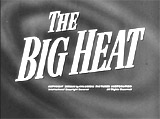
|
A car bombing (with a blinding explosion outside his house) killed Police Sergeant Dave Bannion's (Glenn Ford) beloved wife Katie (Jocelyn Brando) - instead of himself - as he was telling a bedtime story to his young daughter in their house. Moments earlier, Katie had proposed to drive over and get their teenaged baby-sitter Maxine ("Be back in a minute"). Bannion rushed outside, pulled open the driver's-side door and pulled his wife to safety, but she was already dead. In the conclusion's moving death scene, gangster's moll Debby Marsh (Gloria Grahame) was shot twice in the back by gangster Vince Stone (Lee Marvin). Stone was arrested and taken into custody - for the attempted murder of Debby. Bannion suggested that the police now had the evidence they needed to jail the entire corrupt Syndicate. Sympathetically, Bannion cradled Debby's head with her mink coat. Although she was attended by a doctor, she realized that she was dying, as he knelt at her side. She pulled up her mink coat to hide the disfigured, hideous left side of her face in its pillow - he regarded her from her 'good side.'
Because Debby had given her life (like his martyred wife Katie), avenged his wife's death, and tried to change and adopt a decent life, Bannion was now willing to treat her lovingly and comfort her. She longingly looked to Bannion for assurance and approval, and commiserated with him: "Dave, I'm gonna die." In response, he eulogized his wife Katie, speaking of her quick temper and loving nature, their marital relationship, and how they had led a close life together - often sampling each other's drinks, or plates of food. Debby expressed a peacefulness in her final words, referring to Bannion's murdered wife as she died: "I like her...I like her alot," although Bannion continued to lovingly describe his wife and didn't realize that Debby had expired. He smiled as he idealistically remembered more about his wife, his "princess" daughter, and their blissful family life:
|
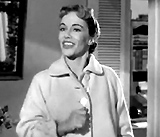 Katie: "Be back in a minute." 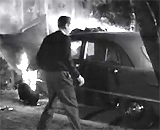  Car Bombing of Wife Katie  Death of Debby |
|||||||||
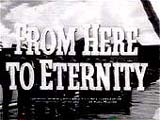
|
Soldier Pvt. Robert E. Lee "Prew" Prewitt (Montgomery Clift) learned of the Pearl Harbor attack on the radio at Alma's (Donna Reed) place and how the infantry units at Schofield Barracks had moved out and were manning beach positions. The broadcaster warned:
Exasperated by the news on the evening of December 7th following the morning's attack, AWOL Prewitt who was still bandaged and weak, insisted upon joining his men now that war had broken out. He wanted to be a loyal, fighting soldier against the enemy, despite his individualistic nature. Alma pathetically pleaded and begged with him to remain - she even offered to marry him! But as Sgt. Milt Warden (Burt Lancaster) had earlier decided, he felt he must return to the base and be loyal and patriotic as a "soldier" to the service. Alma could not understand his unrequited love and heroic dedication to the Army - an institution that had treated him "like dirt." "What do you want to go back to the Army for?" she asked. After ignoring Alma's entreaties, Prewitt attempted to return to the barracks in the dark. He was accidentally and tragically killed by sentinel guards - his own men, emphasizing his 'outsider' status. In the darkness, they reacted nervously to him (thinking that he was a Japanese ground-based saboteur) when he failed to halt and identify himself. At the place of Prewitt's death, Warden reacted to the news of the "good soldier's" demise with praise and a glorifying epitaph, and explained why he didn't stop: "He was always a hardhead, sir. But he was a good soldier. He loved the Army more than any soldier I ever knew." Warden grieved over Prewitt's dead body with a eulogy. He regretfully cursed Prew's perpetual stubbornness and overt individuality that indirectly led to his death - when he couldn't "play it smart":
Then he changed his tone after looking up at the guards:
|
     "Friendly Fire"   Sgt. Warden's Reaction |
|||||||||

|
Hanging out on the boardwalk of Grafton's porch above the muddy street, black-clothed evil gunman Jack Wilson (Jack Palance) challenged, provoked, and taunted the proud, hot-headed ex-Confederate Frank Torrey (Elisha Cook, Jr.) who was determined not to be pushed around, and chided as on the rebel-losing side of the Civil War. Tottering in the mud below Wilson, the diminutive Torrey retaliated angrily, standing up to the evil, cold-blooded mercenary: "You're a low-down lyin' Yankee." Wilson challenged him with the enticement:
Torrey was tricked into drawing on the deadly gunfighter before being brutally gunned down in the one-sided gunfight. Torrey half-drew his weapon but was beaten and sensed death - Wilson paused after outdrawing him, and then pulled the trigger with a deafening gunblast. In the powerful death scene, Torrey was propelled and jerked backwards and his back slammed into the thick mud in the street. A cowhand added his footnote comment: "One less sodbuster." There was also a fatal shoot-out between Shane (Alan Ladd) and Wilson, leading to Shane's wounding and the final ambiguous shot of the title character slumped on his saddle as he rode off on his horse toward the mountains - to die? |
   Wilson vs. Torrey in the Mud |
|||||||||
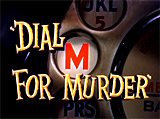
|
In Hitchcock's classic thriller, charming and sophisticated Tony Wendice (Ray Milland) blackmailed Swann/Captain Lesgate (Anthony Dawson), a former classmate with a criminal record, to commit the "perfect murder" - the killing of his wealthy, unfaithful wife Margot Wendice (Grace Kelly) in order to inherit her fortune. She was engaged in an affair with TV mystery writer Mark Halliday (Robert Cummings). During the attempted strangulation scene, the tension was ratcheted up. Tony's plan was to have his wife leave her bedroom to answer the living room phone, to enable Swann to strangle her from behind the window curtains where he was hiding. Tony dialed the number, but because his watch had unexpectedly stopped, he was about eight minutes too late. The assassin was frazzled and about to leave because of the delay. When the phone finally rang, the camera slowly panned to the left around Margot as she answered. The camera moved to view Swann's position behind the curtains. Reflections from the fireplace played upon the walls in the darkened room. He approached with a twisted scarf and wrapped it around her neck. But she foiled his strong attack.
There was the tremendous 3-D effect of Margot reaching back behind her - into the audience from the screen - searching for a weapon (a pair of scissors) to defend herself and kill the assassin by stabbing him in the back. When he theatrically fell to the floor onto his back, the blades of the scissors were pushed more deeply into his body. |
  The Attack by Lesgate on Margot |
|||||||||

|
Norman Maine (James Mason) announced that he was going to start his changed life with a healthy regimen of swimming ("a happy mind...a happy body") - to turn his life around. He said he was "fit as a fiddle and ready for love." He suggested "some changes around the house" to unsuspecting wife Vicki (Judy Garland), to liven it up. He suggested she prepare hot soup and sandwiches as a meal for after his swim. When he requested that she sing a song for him, she thought it silly, and said she would open the kitchen windows so he could hear her from there. He then made one final request, stopping short to take one long look at her before she walked away out of view:
As Norman walked outside onto the deck, he heard her singing from afar: "It's a New World" - her voice continued to be in the background for the remainder of the sequence. Norman began to walk toward the ocean (seen reflected in the glass doors) and came up to the water, where he removed his outer robe. In a long shot, he began to walk toward the setting sun on the horizon - and committed suicide by drowning himself (off-screen). His cast-aside robe was caught by the rising tide and washed away. It was a genuinely tragic, but inevitable demise. The headlines of the Los Angeles Sun ruled the death an accident: "Ex-Film Star Victim of Accidental Drowning," although it was obvious that he had sacrificed his life for her so that Vicki could fulfill her potential in her career. |
    Tragic Suicidal Off-Screen Drowning |
|||||||||

|
Les Diaboliques (1955, Fr.) Long-suffering, enslaved and invalid widow Christina Delasalle (Vera Clouzot) died from a heart attack when watching her husband Michel Delasalle (Paul Meurisse) rise zombie-like from the bath where she thought he was dead from drowning. After rising, he removed fake white covers from each eyeball. |
 Rising From the Tub   Zombie-Like Appearance Caused Heart Attack |
|||||||||

|
This film noir ended with an amazing finale - an explosive, nihilistic/apocalyptic blast. Femme fatale Lily/Gabriel Carver (Gaby Rodgers) lifted the leather top from the case of the leather-strapped, metal-lined Pandora's Box (known as "the great whatsit"). She then touched the lid, feeling the heat with her caress. Undeterred, disobedient and ignorant, she raised the lid in a quest for knowledge of what was contained within - a hissing, hellish, unearthly noise emanated from the interior of the box as the searing, blinding, white-hot light hit her face. She pursued her perverse fascination with the fiery light by lifting the lid even higher. As she unleashed the apocalyptic forces inside and the box could not be closed, she became a flaring pillar of fire as it consumed her. As the destructive, white-hot, evil forces were freed, she became a shrieking, human torch. Revived detective Mike Hammer (Ralph Meeker) stirred on the floor where he witnessed Lily's horrible death - incineration in a powerful nuclear explosion at the beach house. Whether Hammer and his assistant Velda (Maxine Cooper) survived or not was not entirely clear when the film abruptly ended. In the film's restored version, they staggered onto the beach after escaping from the burning house and hugged each other in the surf. |
 
Radioactively Fried by "The Great Whatsit"  The Beach-House Explosion 
|
|||||||||

|
In a frightening yet subdued murder scene, in their upstairs bedroom that looked more like a high, A-framed church and was lit with weird, ecclesiastical lighting, Preacher Harry Powell (Robert Mitchum) forcefully wanted gullible newlywed wife Willa (Shelley Winters) to confess to overhearing his conversation with her young daughter Pearl (Sally Jane Bruce) outside the window about the location of hidden $10,000. She had caught on to his lies, but it was too late. As she laid on her back on the bed with her arms crossed over her chest, she was resigned to her death as a perverted kind of salvation. Willa offered her confessional before being saved and delivered by death:
Convinced that she knew nothing about where the money was hidden, Powell played out the scene as if it was a prayer service and a communal sacrifice, and Willa obliged. He gave the benediction, and then raised his switchblade knife high above her (in his right hand - the one marked with LOVE) to carry out the ritualistic murder - on the altar-bed. The scene ended with a wipe left before she was killed (off-screen). Later, there was the haunting revelation of her corpse's 'burial' spot. A nightmarish, hypnotically-eerie image dissolved into view - water reeds flowed in underwater current. Willa's corpse was strapped to the front seat of Ben's old Model T Ford submerged in the river. Her long blonde hair was tangling, swaying, and mingling diaphanously in the current with the river's underwater reeds. Her throat had been slashed - another of Powell's female victims with her body cut open. |
 Knifed to Death in A-Frame Bedroom  Revelation of Corpse Underwater |
|||||||||

|
Richard III (1955, UK) The British film adaptation of Shakespeare's play, King Richard III, was directed and produced by its lead star, Laurence Olivier. Scheming King Richard III (Laurence Olivier) fell off his horse during the film's major battle scene at Bosworth Field (the House of York vs. the House of Lancaster). He lost his crown and his helmet, but then was able to abscond with another's horse. But then the second horse was shot out from under him by a bow and arrow. Basically defenseless and on foot, he cried out:
He found himself surrounded by Lancastarian troops, which attacked and fatally wounded him. In the end, he convulsed on the ground with several spasms, and then held his sword toward the sky as he died. |
 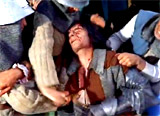   Death on the Ground Without a Horse |
|||||||||
(chronological by film title) Intro | 1915-1929 | 1930-1933 | 1934-1938 | 1939 | 1940-1942 | 1943-1945 | 1946-1947 | 1948-1949 1950-1952 | 1953-1955 | 1956-1957 | 1958-1959 1960-1961 | 1962-1963 | 1964-1966 | 1967-1968 | 1969-1970 1971 | 1972 | 1973 | 1974 | 1975 | 1976 | 1977-1978 | 1979 1980 | 1981 | 1982 | 1983 | 1984 | 1985 | 1986 | 1987 | 1987 | 1988 | 1989 1990 | 1991 | 1992 | 1993 | 1994 | 1994 | 1995 | 1995 | 1996 | 1997 | 1998 | 1998 | 1999 2000-2001 | 2002 | 2003 | 2004 | 2005 | 2006 | 2007 | 2008 | 2009 | 2010 | 2011 |